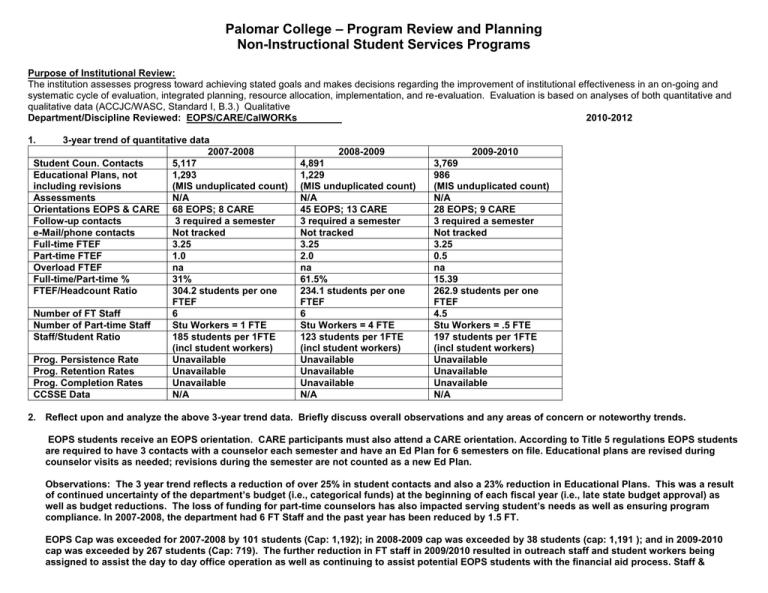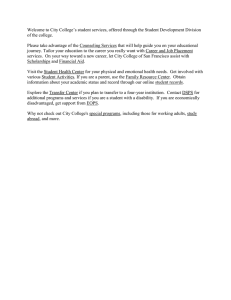EOPS/CARE/CalWORKS
advertisement

Palomar College – Program Review and Planning Non-Instructional Student Services Programs Purpose of Institutional Review: The institution assesses progress toward achieving stated goals and makes decisions regarding the improvement of institutional effectiveness in an on-going and systematic cycle of evaluation, integrated planning, resource allocation, implementation, and re-evaluation. Evaluation is based on analyses of both quantitative and qualitative data (ACCJC/WASC, Standard I, B.3.) Qualitative Department/Discipline Reviewed: EOPS/CARE/CalWORKs 2010-2012 1. 3-year trend of quantitative data 2007-2008 Student Coun. Contacts 5,117 Educational Plans, not 1,293 including revisions (MIS unduplicated count) Assessments N/A Orientations EOPS & CARE 68 EOPS; 8 CARE Follow-up contacts 3 required a semester e-Mail/phone contacts Not tracked Full-time FTEF 3.25 Part-time FTEF 1.0 Overload FTEF na Full-time/Part-time % 31% FTEF/Headcount Ratio 304.2 students per one FTEF Number of FT Staff 6 Number of Part-time Staff Stu Workers = 1 FTE Staff/Student Ratio 185 students per 1FTE (incl student workers) Prog. Persistence Rate Unavailable Prog. Retention Rates Unavailable Prog. Completion Rates Unavailable CCSSE Data N/A 2008-2009 4,891 1,229 (MIS unduplicated count) N/A 45 EOPS; 13 CARE 3 required a semester Not tracked 3.25 2.0 na 61.5% 234.1 students per one FTEF 6 Stu Workers = 4 FTE 123 students per 1FTE (incl student workers) Unavailable Unavailable Unavailable N/A 2009-2010 3,769 986 (MIS unduplicated count) N/A 28 EOPS; 9 CARE 3 required a semester Not tracked 3.25 0.5 na 15.39 262.9 students per one FTEF 4.5 Stu Workers = .5 FTE 197 students per 1FTE (incl student workers) Unavailable Unavailable Unavailable N/A 2. Reflect upon and analyze the above 3-year trend data. Briefly discuss overall observations and any areas of concern or noteworthy trends. EOPS students receive an EOPS orientation. CARE participants must also attend a CARE orientation. According to Title 5 regulations EOPS students are required to have 3 contacts with a counselor each semester and have an Ed Plan for 6 semesters on file. Educational plans are revised during counselor visits as needed; revisions during the semester are not counted as a new Ed Plan. Observations: The 3 year trend reflects a reduction of over 25% in student contacts and also a 23% reduction in Educational Plans. This was a result of continued uncertainty of the department’s budget (i.e., categorical funds) at the beginning of each fiscal year (i.e., late state budget approval) as well as budget reductions. The loss of funding for part-time counselors has also impacted serving student’s needs as well as ensuring program compliance. In 2007-2008, the department had 6 FT Staff and the past year has been reduced by 1.5 FT. EOPS Cap was exceeded for 2007-2008 by 101 students (Cap: 1,192); in 2008-2009 cap was exceeded by 38 students (cap: 1,191 ); and in 2009-2010 cap was exceeded by 267 students (Cap: 719). The further reduction in FT staff in 2009/2010 resulted in outreach staff and student workers being assigned to assist the day to day office operation as well as continuing to assist potential EOPS students with the financial aid process. Staff & students provide when requested by high schools and the college’s Financial Aid department to conduct financial aid workshops, information and assistance at local high schools in our district and outreach events in the community. The focus on assisting students with financial aid was to ensure that students obtained other financial resources due to the reduction in EOPS monetary services (i.e., elimination of bus passes, grants, meal tickets and the reduction in book vouchers). FTEF Headcount Ratio may still inaccurately imply or reflect the number of students a counselor may be assigned during an academic year: the unduplicated MIS student count is derived from the initial contact of student with an EOPS counselor following the new student orientation. If the student does not return after that first contact, the student is counted throughout the year in the unduplicated MIS count. Also continuing EOPS students who do not complete the mandatory 3 Counseling contacts will be counted throughout the year in the unduplicated MIS count if they meet once with an EOPS Counselor. On-line contacts and phone contacts are not consistently documented therefore they are not reflected in the above student-counselor contact number. During the 2009-2010 school year, the District provided funds as well as allocated one-time federal stimulus funds to ensure that counseling and staff services were maintained. However, when the Director (i.e., funded by District funds) retired the District determined that it would exercise the opportunity to seek a waiver to not fill the position until the state’s budget crisis improves. The Director of Financial Aid, Veterans & Scholarships Services is serving as the Interim Director (i.e., 50%). It is vital to our educational and economically at risk disadvantage students that enroll at the college and those that enter into the EOPS program that the District continue its support and monetary contribution to maintain services. _____________________________________________________________________ 3. Reflecting on the 3-year trend data, describe/discuss department/discipline planning related to the following: PLAN – 2010-2012 Assessment/Outcome – 2010-2012 Programs changes/improvements: 1) Continue collaboration with the Early Acceptance Program and the Financial Aid Department to ensure that economically and educationally disadvantage students from high school have a seamless transition to the college. In addition that they obtain all necessary information and assistance with regards to academic counseling, registration, EOPs services and financial assistance. 2) Implement an EOPs Disqualification Process that includes a petition stage, probationary period and appeal process. We will also assessing the Release of Services process and the Director’s waiver determined by the counselors. 3) Establish orientations at an early stage for new students, provide workshops and field trip to better prepare students when meeting their counselor, registering for courses or deciding on a major and establish 2nd contact requirements prior to 8th week/withdrawal deadline (i.e., ability to counsel students about withdrawing when failing to avoid a punitive grade) as part of intervention as required in Title 5 regulations. 4) Move towards a paperless operation and maximize the availability of technology to access and share information as well as maintain records according to Title 5 regulations. 5) Continue to maintain District commitment to maintain current staff, book awards of $225, and seek other avenues such as book rental programs and monetary incentives for students to meet with a counselor. 4. To implement the planning described in question #3, discuss/identify the necessary resources requested to successfully implement: PLAN 2010-2012 Assessment/Outcome – 2010-2012 a. Equipment/Technology -block grant funds, VTEA, other resources, etc. There is a need to maximize current technology available at the college (Peoplesoft) and customize pages to move the department into a paperless operation. We will need funds for document scanning equipment to archive old documents that must be maintained. Funds are also need to hire a consultant or pay overtime funds for current systems module functional specialist to develop and implement pages that counselors will enter information electronically. Continue to obtain PERKINS funds for the workshops and also establish a stronger partnership with other Student Services programs. a. Budget - budget development process, one-time funds, grants, etc. Continue seeking district support and contribution to maintain staffing and services to student. Obtain additional funds for: One document scanning equipment plus desktop computer station - $5,,000 Consultant -- $5,000 b. Facilities - scheduled maintenance needs, additional space/offices due to growth, remodeling, etc. Since the Library remodel is on hold for another 5 years, we need to look into the possibility of relocating the EOPS department in the current Student Services building with General Counseling or in the AA building. Provide EOPS counseling services at the Escondido Center at least once a week and provide it as an overload for permanent counselors. c. Faculty position(s) - faculty priority process and projected full-time needs for 1-3 years above the Counselor formula Continue to support the joint partnership of DRC and EOPS and that EOPS students who are also DRC students see the DRC counselor. Until the program cap and categorical funding increases we cannot seek another FT counselor. d. Staff position (s) - changes staffing needs due to program growth, new technology, etc. Staffing needs will be reviewed within state funding, and additional positions for Outreach and/or the front desk supporting Counseling services may be requested. Continue to seek District support and funding to maintain staffing and services. e. Other Establish a stronger relationship and partnership with General Counseling. Note: This may necessitate relocation in or near General Counseling. Training on the new Academic Advisement Program to provide efficiency and ensure accuracy. This will also ensure that students continue to maintain eligibility for federal financial aid. 5. Discuss one department/discipline goal linked to Palomar’s Strategic Plan 2012 and how it will support the success of students. In support of the College Strategic Goal # 2 – Strengthen programs and services in order to support our student’s educational goals: EOPS and CalWORKs have successfully implemented student surveys for SAOs during the past years and will continue with the surveys. 6. Service Area Outcome progress: a. Describe a learning outcome at the program level and the assessment method used to measure student learning of that outcome. A questionnaire has been administered to 100 students prior to their first counselor visit, and another questionnaire will be administered in spring 2008 for comparison of information. SAO: After participating in a 45 minute counseling session, students will understand how to use the internet to retrieve and research academic, career, personal, and financial aid information. Update: A 4 question survey will again be handed out to EOPS students in spring 2011. b. Describe a learning outcome that is difficult to assess. Student: Identification and communication of needs to the counselor. A survey is currently being developed and will be handed out to students before the end of Fall 2010. 7. Describe a department accomplishment that you would like to share with the college community. - The EOPS Department will continue to sponsor a Thanksgiving Basket drive to give to EOPS students and their family. In addition, the Holiday Toy Drive with the partnership of Campus Police has been a success and will continue. During the 2009-2010, the department continue to maintain efficient and effective services while not having a full-time Director. -Partnership with Financial Aid has resulted in a higher number of EOPS students being served by both programs. 8. Are there other resources (including data) that you need to complete your department/discipline review and planning? There is a need to obtain enrollment data and graduation/transfer data from Institutional Research. For programs with an external accreditation/program review, indicate the date of the last accreditation visit and discuss recommendations and progress made on the recommendations. 9. Other comments, recommendations ________________________________________________________________________________________________________________________________ ________________________________________________________________________________________________________________________________ __________________________________________________________________________________________________________________________ Please identify faculty and staff who participated in the development of this plan: Program Director, Office Supervisor, Counselors, Staff Assistants and Staff Aide, and Student Workers. Name/signature Date
